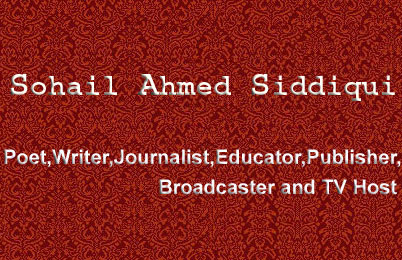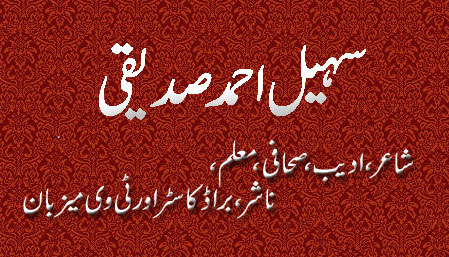SAS-As Poet
Sohail Ahmed Siddiqui might claim to have some literary germs, inherited from distant relatives, who earned name and fame in literature. “But, I’m what I’m, only because of my own struggle, at the blessings of Almighty Allah”, he insists. He could only meet a few of them. He first rhymed few lines when he was a child, then went on to compose Nazm-e-Azad (free-verse) and Ghazal (the lyrical verse), when he was a student of secondary classes. During that span, he also tried to improve poetry of his classmate, Dr. Faiyaz Alam Siddiqui, now a politician-cum-social worker. It continued the same way till he passed Intermediate, but then he realised that all that stuff was merely a practice of rhyming, i.e. ‘Qaafiya-bandi’ in Urdu. Thus, he destroyed all pieces of poetry by tearing them apart.
There is an interesting account of how Sohail showed his maturity in the immature stage regarding essence of poetry. When his teachers introduced him to the viva examiner of physics, in his board exams, as the poet, he started queries about poetry, instead of science subject. Sohail insisted on the subject, first. So, the guest asked him a few questions regarding physics, and then switched over to poetry, again. He asked him who his favourite poet was. Sohail just stunned him by saying, ‘I don’t like poets, rather like poetry’.
Then in 1992, he fell seriously ill, while preparing for the examinations of MA (final). Eventually, he felt something coming down his mind, in the memory of the lost love, so quickly, that he had to leave the bed and caught the very thought on the paper. ‘Mujh ko Tanha Na kar’ (Leave not me Alone) was the real start of his poesy, published in Monthly Takleeque, Lahore, after several years. Most amazingly, English translation of this poem, ‘Leave not me Alone’ became a part of a world anthology, published by US-based National Library of Poetry, in 1992, as someone forwarded them his name, as a poet.
He has been very humble about his own poetry, avoiding its publication and recitation, for several years onwards. However, as a result of a strong appreciation and a pushback from several seniors, he then decided to expose his poetic talent, quite freely.
While working on French Haiku to get them introduced in Urdu, he became enthusiast of this unique, condensed and compact Japanese genre and started writing Urdu Haiku, as soon as he was invited to contribute the same for a literary journal of India. This was 1998. The same year, he laid down the foundation of his novel literary magazine, Haiku International-the premier and only multi-lingual Haiku journal of South Asia, also the world’s foremost online journal of its kind from the same region.
GHAZAL By SAS
As mentioned earlier, Sohail Ahmed Siddiqui had started rhyming at an early age, but he tried to write a Ghazal, first, when he was a student of Class-IX. However, it was a childish effort, leading him to the path of practicing only. It continued the same way till he passed Intermediate examinations, but then, he realised that all that stuff was merely a practice of rhyming, i.e. ‘Qaafiya-bandi’ in Urdu. Thus, he destroyed all pieces of poetry by tearing them apart.
He has been very humble about his own poetry, avoiding its publication and recitation, for several years onwards. However, as a result of a strong appreciation and a pushback from several seniors, he then decided to expose his poetic talent, quite freely.
And now when his several Ghazal has been published throughout world, he likes Ghazal the most, but finds himself better, in Nazm, due to his natural talent in showing some eloquence.
• His Ghazal had been included in ‘Mudeer Sho’ra kee GhazleiN’ (Ghazals by Editor-Poets), edited by Professor Dr. Manazir Ashiq Harganvi and published in 2002, from New Delhi, India.
• One of his Ghazal had won prize and became a part of ‘Souch-Rut’ (The Season of Thought)-Prized Ghazals of 2002, edited by Sultan Sukoon (Kehal, Abbottabad, Pakistan) and Gul Bakhshalwi (USA)
NAZM (VERSE) BY SAS
Sohail Ahmed Siddiqui had started rhyming at an early age. This was Nazm, i.e. Verse in his mother tongue, Urdu. After passing through the transitional period of his poetry, he has emerged, as a successful poet of this genre, with a number of published items in Urdu, as well as English.
• As lyricist, he had participated in an all Pakistan lyrics contest, held by the Govt. of Pakistan, in 2007, result of which is still pending.
• As a Creative Copywriter, he used to compose extempore poetry for TVCs, quite often, as a part of his job. In this regard, he has also done some marvellous pieces in Urdu and English. The most prominent was a jingle for Junior (a brand of Popular Juices) in English and another in Urdu for National Highway Authority.
Na't poetry by SAS
Being a practicing Muslim, Sohail Ahmed Siddiqui takes it as his priority to write Na’t, in praise of Holy Prophet Muhammad (May peace & blessings of Allah be upon him), when it comes to devotional poetry. Till now, he has written only a few such devotional poems in Urdu.
Humorous poetry by SAS
Having practised parody in his several private gatherings in past, Sohail Ahmed Siddiqui countered another parody poetry by a poetess in his own WhatsApp Group, through his altogether fresh humorous poetry in Urdu.
Sohail and other Urdu Genres
Being famous as Haiku-poet, Sohail has also made sincere efforts to promote other Urdu genres, through his Urdu and English writings. He is the author of foremost English essay on Urdu Mahiya Movement, written at the persuasion and in collaboration with Haider Qureshi, the major promoter of the movement, it was published by Daily Dawn, the largest selling English newspaper of Pakistan. Earlier, he had written a detailed research-oriented article on Douha, the most precise Urdu genre in Urdu, first, (which was very appreciated by many), then reproduced it, with necessary edits for English newspaper, Dawn.
He had also written an informative Urdu article on Triolet for a UK-based Urdu literary magazine.














